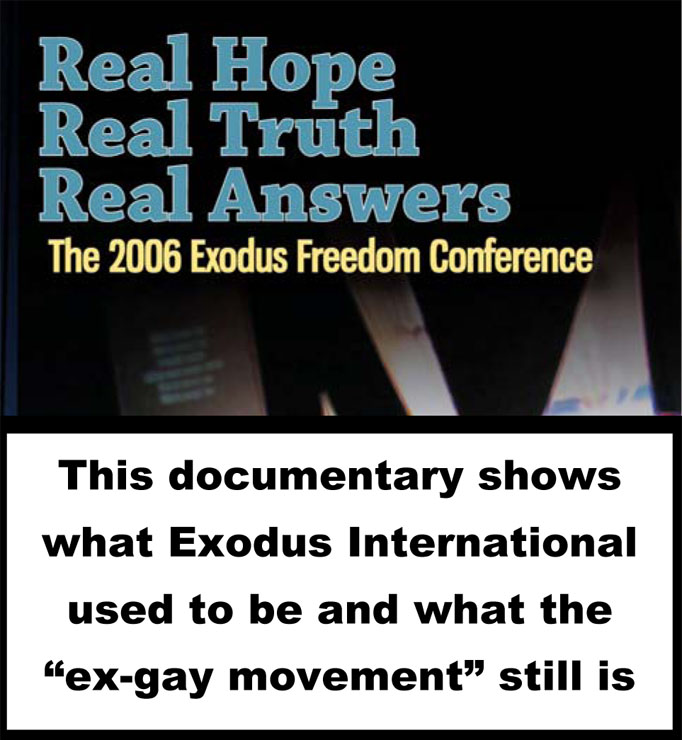Homosexuality – Theological Intro
By Thomas Coy
September 2008
Introduction to the theological aspects of homosexuality and the gay rights movement
As a student of the medical debate over homosexuality, the gay rights movement, and the Bible, I believe I have an insightful perspective on the debates over homosexuality. In the last half of the twentieth century a divisive theological debate over homosexual behavior developed when gay activists created their own revisionist interpretation of the Bible to support their claim that homosexual behavior is neither immoral nor sinful. This revisionist theology has been labeled “gay theology.” Many Christians are not aware that in 1968 a gay activist started a Christian denomination called the Metropolitan Community Church based on gay theology. In this introduction I will point out some obvious errors in gay revisionist arguments and outline a much wider scope of biblical principles that are related to how the church deals with homosexuals and the gay political movement.
Scripture and gay revisionism
Gay activists contend there are only seven scriptures that address homosexuality in the Bible and therefore homosexual behavior is insignificant in scripture. Gay activists also contend that theologians have misinterpreted the seven scriptures. The seven main scriptures are the Genesis account of Sodom and Gomorrah (Genesis 19), the Mosaic Law in Leviticus 18:22 and 20:13, the letter by Jude verse 7, and the Apostle Paul’s letters in Romans 1:26-7, 1 Corinthians 6:9-11, and 1 Timothy 1:9-10.
Gay activists like to point out that none of these scripture references are in the first four books of the New Testament that record the direct teachings of Jesus. The gay argument is that since Jesus never mentioned homosexual behavior, it should not be considered immoral. That argument lacks any merit when one realizes that Jesus never mentioned bestiality either (humans having sexual relations with animals – another aberrant sexual orientation). Using the same gay logic would imply that a human having sex with an animal is not immoral behavior. Bestiality is listed as a sin in the Mosaic Law right after male homosexuality in Leviticus 18:23. Male homosexual behavior and bestiality are the only immoral sexual behaviors listed in Leviticus 18 that include the adjectives of “detestable” and “perversion.” The gay insignificant argument also fails the test on the bestiality comparison because there are even less scriptures that address humans having sex with animals.
Leviticus 18:22 explicitly states, “Do not lie with a man as one lies with a woman: that is detestable.” (NIV) Gay theology argues that the type of homosexual behavior condemned in Leviticus does not include homosexuals in loving and consensual relationships. This gay argument is also without merit when one studies the content of Leviticus 18. Most of Leviticus 18 condemns various close relative and incestuous heterosexual relationships. The author of Leviticus condemns fourteen heterosexual relationships between close relatives and no homosexual incestuous relationships. The obvious reason Leviticus 18 does not list homosexual close relative relationships is because verse 22 condemns all homosexual behavior.
Other arguments put forth by gay theology are that the word for homosexual has been misinterpreted in the passages of the Apostle Paul’s letters; God destroyed Sodom and Gomorrah not because homosexual behavior was prevalent in those communities, but because its citizens were inhospitable and sought to rape the male visitors; and the close friendships between Jonathon and David in the Old Testament as well as Jesus and the Apostle John in the New Testament were actually homosexual relationships. The key to all these arguments is still found in Leviticus 18. If Leviticus 18 condemns all homosexual behavior, which I believe it clearly does, these other gay arguments have no foundation for their devious assertions.
Once homosexual behavior is established biblically as sexual immorality along with adultery, close family heterosexual relationships, and bestiality, a host of other biblical scriptures apply to homosexual behavior. The Apostles gave four firm requirements to the non-Jewish Christians in the early church, “to abstain from food sacrificed to idols, from blood, from the meat of strangled animals and from sexual immorality.” (Acts 15:20 NIV) The Apostle Paul wrote, “Flee from sexual immorality. All other sins a man commits are outside his body, but he who sins sexually sins against his own body.” (1 Corinthians 6:18 NIV) In his letter to the Ephesians Paul wrote, “But among you there must not be even a hint of sexual immorality, or of any kind of impurity, or of greed, because these are improper for God’s holy people.” (Ephesians 5:3 NIV) There are many other New Testament verses with similar instructions to avoid sexual immorality.
“If anyone is in Christ, he is a new creation.”
In the Ephesians quote sexual immorality is placed into the larger group of sins that Christians are not to do. In some of his letters the Apostle Paul describes mankind as having an inborn nature that seeks to gratify sensual cravings (Galatians 5 and Romans 8 are examples). He often refers to these base desires as the “sinful nature.” Most people can identify with that assessment through the knowledge of their own sensual desires. According to the apostles this sinful nature leads to sins of selfish ambition or greed, jealousy, envy, pride, fits of rage, drunkenness, theft, slander, orgies and other sexual immorality. The Christian is required to abandon the desires of the flesh through the power of the Spirit that is sent by Jesus Christ, and to seek the desires of the Spirit that enters them. The more the Christian seeks the leading of the Spirit the more the Christian should demonstrate ‘love, joy, peace, patience, kindness, goodness, faithfulness, gentleness and self-control.” (Galatians 5:22 NIV)
How a person responds to the leading of the Spirit is a litmus test of their faith and a measure of the maturity of their relationship with God. The Apostle John states this principle clearly in his first letter, “No one who is born of God will continue to sin, because God’s seed remains in him; he cannot go on sinning, because he has been born of God. This is how we know who the children of God are and who the children of the devil are.” (1 John 3:9-10a) When a Christian sins he/she seeks forgiveness and Jesus Christ speaks to the Father in their defense (1 John 2:1), but they are commanded to learn from their mistake and not continue in that sin. I found over thirty references in the New Testament that support the theme that Christians not only have the power to turn from sinful behavior, but that they are required to.
The churches response to sin
The Christian church is a body of sinners who have been saved and transformed by the grace of God. As the oft quoted verse reads, “for all have sinned and fall short of the glory of God, and are justified freely by his grace through the redemption that came by Jesus Christ.” (Romans 3:23-4 NIV) Generally, Christians are not able to overcome the desires of their sinful nature immediately after choosing to follow Jesus, although many have. For most it is a maturing process that often times has to overcome compulsive addictive behavior. Sexual immorality, including homosexual behaviors, is often a compulsive addictive behavior.
A recurring question faced by many local churches as well as Christian denominations is how to address those in the church who profess that homosexual behavior is not immoral – to affirm the homosexual by agreeing that his/her behavior is not sin. There is a critical difference between the sinner who knows that their behavior is sinning against God, and the sinner who denies that their behavior is sinning against God. If adultery is used as another example, the former sinner knows that their adulterous behavior is wrong, while the latter denies that their adulterous behavior is wrong. The church can and should work with a person who repents of adultery and seeks to change their behavior. But how is the church supposed to deal with the person who openly lives an adulterous life, denies any wrongdoing, and wants to be an active member in the church? That is the situation churches are faced with today when openly gay identified individuals seek to be part of a church body that believes the Bible condemns homosexual behavior as sin.
There are scriptural passages that address unrepentant sinners within the church body. The best example involves a case of sexual immorality in the church at Corinth. At Corinth a man had married his father’s wife, presumably his stepmother. It is quite possible the woman was the same age as the man, twenty plus years younger than his father. It is also possible that the man’s father had died. Such a situation would be legal in America and would probably put any Christian church leadership in a state of confusion.
Leviticus 18:8 states, “Do not have sexual relations with your father’s wife: that would dishonor your father.” (NIV) The Apostle Paul clearly saw the Corinth sexual relationship as sinful. His directions to the church leaders at Corinth detail a biblical double standard that requires more accountability within the church body. “I have written you in my letter not to associate with sexually immoral people – not at all meaning the people of this world [outside the church body] who are immoral, or the greedy and swindlers, or idolaters. In that case you would have to leave this world. But now I am writing you that you must not associate with anyone who calls himself a brother but is sexually immoral or greedy, an idolater or a slanderer, a drunkard of a swindler. With such a man do not even eat. … “Expel the wicked man from among you.”” (1 Corinthians 5:9-11, 13b)
Paul’s instructions to expel the sexually immoral person seem very cold and harsh to some, but his intentions were compassionate. This was Paul’s rendition of tough love as an earlier verse shows, “When you are assembled in the name of our Lord Jesus and I am with you in spirit, and the power of our Lord Jesus is present, hand this man over to Satan, so that the sinful nature may be destroyed and his spirit saved on the day of the Lord.” (1 Corinthians 5:4-5) The purpose of this church expulsion was to encourage repentance and a changed behavior, so that the man would enter into heaven instead of hell.
There appears to be more to this story and lesson. In Paul’s second letter to the Corinthians a repentant sinner was being repelled by the Corinth congregation. There is a good possibility it was the man who had taken his father’s wife, and through the church discipline he repented and broke off the marital relationship, and sought to return to the fellowship of believers. If that is the case, then the Corinth church did not accept his plea for forgiveness. Paul had to instruct the church leaders again with this message, “The punishment inflicted on him by the majority is sufficient for him. Now instead, you ought to forgive and comfort him, so that he will not be overwhelmed by excessive sorrow. I urge you, therefore, to reaffirm your love for him.” (2 Corinthians 2:6-8 NIV) Paul who in his first letter appears so hardened toward sexual sin within the church body now has to exhort the Corinth church to open their arms and have compassion for the repentant sinner
Listening to the testimonies of Christian ex-gays one soon realizes that most Christian churches have made the same mistakes that the church in Corinth made in the first century. Many ex-gays have had experiences where Christian churches have refused to accept them as repentant sinners. At the other extreme many ex-gays have been to Christian churches that accept homosexual behavior within their membership and do not teach the biblical standard of sexual morality. The biblical response to the church regarding repentant sinners involves both commitment and discernment. “Brothers, if someone is caught in a sin, you who are spiritual should restore him gently. But watch yourself, or you also may be tempted. Carry each other’s burden, and in this way you will fulfill the law of Christ.” (Galatians 6:1-2 NIV)
I would argue that the Exodus ministries are some of the best examples of how the Apostle Paul intended for the church to help its members overcome sin and become more Christ-like. Exodus ministries work with repentant sinners one on one with a spirit of love and accountability. The spirit of love includes empathy, time investment, and friendship, while the spirit of accountability seeks the same requirement of both the helper and the one seeking assistance; that requirement is the removal from one’s life of sexual immorality and every kind of impurity.
Biblical warnings
I have found many warnings in the New Testament that I believe apply to the Christian gay rights movement. Many liberal moral leaders will not like what I perceive in these scriptures, but my obligation is to state the truth as I see it. My interpretation is based on the presumption that the Bible clearly condemns homosexual behavior as sin, which is the dividing line in the conflict over homosexual behavior in the church.
What I have observed in the morally liberal churches is a moral relativist philosophy toward homosexual behavior and consensual sex outside of marriage. Homosexual behavior is promoted as a morally acceptable alternative to the biblical heterosexual norm. No effort is made by the morally liberal church to turn an individual away from homosexual behavior. By affirming homosexual behavior the morally liberal church helps lead the person with same-sex attractions into homosexual behavior; especially young adults who may have gender identity issues or have repeatedly experienced same-sex rejection in their childhood. From the traditional biblical position that homosexual behavior is sin, the morally liberal churches help to lead these individuals with same-sex attractions into sin.
Jesus gives a warning that is recorded in Matthew, Mark, and Luke to those that lead people into sin. “And if anyone causes one of these little ones who believe in me to sin, it would be better for him to be thrown into the sea with a large millstone tied around his neck.” (Mark 9:42 NIV) From that warning alone any Christian who believes homosexual behavior is a sin should distance themselves from a church body that claims homosexual behavior is not sin.
The Apostle Paul told the church in Ephesus, “Let no one deceive you with empty words, for because of such things God’s wrath comes on those who are disobedient. Therefore do not be partners with them.” (Ephesians 5:6-6 NIV) To the Christians in Rome Paul wrote, “I urge you, brothers, to watch out for those who cause divisions and put obstacles in your way that are contrary to the teaching you have leaned. Keep away from them.” (Romans 16:17 NIV)
Christians who return to sinful behavior
There are many people who have professed to being Christians only to return to the sinful behaviors of their past. There are other people who have professed to be Christians who have yielded to new sinful temptations. These behavioral failings destroy their witness for Christ and usually damage family relationships. Common behavioral failings include internet pornography, adultery, and drug and alcohol abuse. Other less obvious failings include obsessive greed, slander, jealousy, and theft. There are Christians with same-sex attractions that have returned to the homosexual behavior of their past, and there are individuals who have left heterosexual marriages to identify as gay, some of whom profess to be Christians. Those professing to be Christians obviously stand behind the gay theology maxim that homosexual behavior is not sin.
There are a couple biblical scriptures that address Christians that return to sinful behavior, and they cast a foreboding shadow. The Apostle Peter’s second letter 2:20-21 reads, ‘If they have escaped the corruption of the world by knowing our Lord and Savior Jesus Christ and are again entangled in it and overcome, they are worse off at the end than they were at the beginning. It would have been better for them not to have known the way of righteousness, than to have known it and then to turn their backs on the sacred command that was passed on to them.” (NIV)
The author of Hebrews addresses this subject twice. “It is impossible for those who have once been enlightened … if they fall away, to be brought back to repentance, because to their loss they are crucifying the Son of God all over again and subjecting him to public disgrace.” (Hebrews 6:4-6 NIV) “If we deliberately keep on sinning after we have received the knowledge of the truth, no sacrifice for sins is left, but only a fearful expectation of judgment and of raging fire that will consume the enemies of God.” (Hebrews 10:26-7 NIV) These are stern biblical warnings that apply to those in the church who return to sinful behavior and are overcome by that behavior. Because I believe the Bible clearly condemns homosexual behavior as sin, I believe these verses apply to those in the church that return to or enter into homosexual behavior and claim that their behavior is not sinful. Of course, these verses apply to many other sinful behaviors as well.
Christian leaders who ride the fence
In the church debate over homosexuality there are many denominational leaders who try to accommodate both sides. They believe that some churches within their denomination should be allowed to profess that homosexual behavior is not sinful, even though the majority believe that the Bible clearly identifies it as sin. From my perspective I believe that it is healthy for a Christian denomination to let their individual churches address grey areas as they see fit, but a denomination needs to be united on their major areas of belief. That is what makes a group of churches a denomination. Homosexual behavior is not grey area or a minor area of belief, because if consensual homosexual behavior is a biblical grey area, then all consensual sexual behaviors are grey areas, including wife swapping, promiscuity, incestuous relationships, prostitution, and pornography.
Jesus said his followers were supposed to be “the salt of the earth. But if the salt loses its saltiness, how can it be made salty again? It is no longer good for anything, except to be thrown out and trampled by men.” (Matthew 5:13 NIV) From my perspective Christian leaders who ride the fence on homosexual behavior in the church are like salt that has lost its saltiness. The Christian message cannot be seasoned with salt, if it waivers on whether homosexual behavior is sin. And a Christian denomination cannot be seasoned with salt until leaders who waiver on homosexual behavior are thrown out.
Closing comment
I was discussing these issues on homosexuality with an independent filmmaker in Houston, when she said, “I don’t care if people engage in homosexual behavior in their private quarters.” I was taken back a bit, because I knew I did care and didn’t care at the same time. I was also unclear what she implied by her statement. I had to think that statement through, and out of that thought process came a good example of how Christians need to be prepared to intelligently address issues of homosexuality.
My confusion and a lot of the confusion on issues of homosexuality stem from the fact that in America’s structured society there are different spheres of authority where behavior is subject to scrutiny. I find three distinct spheres where society views homosexual behavior from different perspectives – a medical sphere, a civil law sphere, and a theological or moral sphere. As one who has studied all three of these spheres, I tend to view homosexual issues differently depending on which sphere of authority they pertain to.
To illustrate this concept I am going to give my viewpoints on the filmmakers comment from these three structural spheres. From a medical viewpoint I do not care if two or three or four people engage in consensual homosexual behavior in private quarters, although I have apprehension that they may harm themselves or others. Some of the people engaging in that behavior may have unhealed emotional wounds from their same-sex parent and the behavior might be an attempt to repair that wound. Some may be carrying a sexually transmitted disease. I am not their medical doctor, their psychologist, their psychiatrist, or their close relative, so medically it is none of my business, but as a Christian I should have enough compassion to not want to see these individuals get AIDS or continue in behavior that will deepen their emotional wounds.
From a civil law viewpoint consensual homosexual sex in private quarters is not an infraction of civil law, so from that viewpoint I have no reason to care if people engage in that type of behavior. Sodomy used to be illegal. When it was illegal one could have been concerned that this consensual behavior was breaking the law, and even now some believe that sodomy, like prostitution, should be against the law. On another level as a Christian I care greatly if the civil law tells school children that consensual homosexual relationships are as desirable as heterosexual relationships and equivalent to marriage between one man and one woman, because those types of laws intentionally oppose my Christian moral beliefs.
From a theological viewpoint Christians should be concerned for people who engage in consensual homosexual behavior, because according to biblical scripture it will keep them out of heaven. The Apostle Paul reiterates that warning in 1 Corinthians 6:9-11. In direct contrast to the warning is the desire of God to not want “anyone to perish, but everyone to come to repentance.” (2 Peter 3:9) Followers of God should not want anyone to perish either. For those who are not familiar with this Christian terminology and message, one inherits eternal life (heaven) with Jesus upon repentance of their sins, turning away from sinful behavior, and choosing to follow Jesus. When one refuses to repent of sinful behavior and disregard God’s promise through Jesus, they are destined to perish (hell). Jesus talked about heaven and hell many times referring to hell as a place “where there will be weeping and gnashing of teeth.” To the Christian either heaven or hell represent each individuals eternal destiny.
The simple statement by the filmmaker had many interpretations and implications. For example, a moral liberal would state that they do not care if people engage in consensual homosexual sex in private quarters because they believe consensual homosexual sex is moral behavior. A libertarian could make the same statement and not care if the behavior was moral or immoral, because their main principle is personal freedom. A conservative could make the same statement also and in a mean spirited way imply that they don’t care if that person gets AIDS from their sexual behavior, because they are responsible for their own actions. A Christian could also make the same statement in a callous way and imply that they don’t care if people who engage in consensual homosexual behavior go to hell or get AIDS, because they deserve “the due penalty for their perversion.” (Romans 1:27)
As a Christian I do not identify with any of the four interpretations presented of the filmmakers statement. From my Christian viewpoint, although I agree American society gives people the civil right to engage in consensual homosexual sex in private places, I do care that people engage in this behavior, because ultimately I do not want them to go to hell or to harm themselves or to harm others.
Copyright 2008




